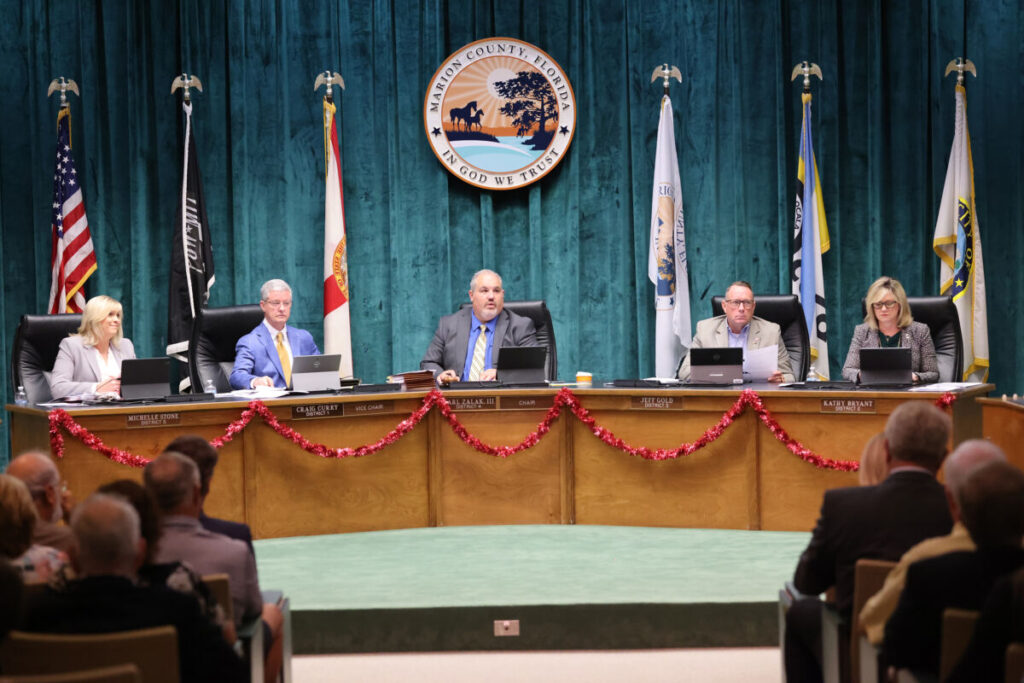County to reexamine issuance of special permits in ag land following lawsuit by OTOW for violations of policy

The Marion County Commission on Dec. 7, 2021. [Bruce Ackerman/Ocala Gazette] 2021.
A proposed settlement agreement for a lawsuit brought by On top of the World Communities, LLC (OTOW) against Marion County started a lengthy conversation by the Marion County Board of County Commission (MCBOCC) at their March 1st meeting in regards to whether or not the county should tighten up what exceptions it makes to its land-use code through granting special permits.
The 2019 lawsuit brought by OTOW against Marion County alleged that the county had bypassed its policy in issuing a special use permit to LS Enterprises Florida LLC that allowed commercial purpose in agriculturally-zoned land to the one-acre lot that fronts S.W. 80th Avenue even though it was unrelated to any other existing or planned development, contrary to the Marion County Comprehensive Plan and the Marion County Land Development Code.
Throughout the discussion, the County Attorney, Guy Minter and commissioners referred to L.S. Enterprises as belonging to “Boyd.” The R. Thad Boyd, III Living Trust Dated March 5, 2016, is a manager of L.S. Enterprises, according to state records.
According to the Complaint and Minter’s own explanation to the MCBOCC, the Boyd property was issued a special permit in an agricultural zone land near another development called Calesa, a project by the same principal of OTOW, without the proper legal notices and correct application process that would have alerted interested parties to voice their objection.
The complaint alleged that “OTOW Communities is an aggrieved or adversely affected party as defined by Section 163.3215, Fla. Stat., because OTOW Communities will be adversely affected to a much greater degree than the community at large, due to the proximity of the OTOW Land to the Subject Parcel and the investment that OTOW Communities has made in planning and carrying out its development and related infrastructure.”
“OTOW objects to piecemeal conversion of rural lands along S.W. 80th Avenue. It is inconsistent with policy 4.3.2.A to permit urban uses in the General Agricultural zoning district. The County is required to permit only rural or agricultural uses until such time that it is appropriate to change the FLUM and zoning district to urban designations, which should be implemented in a carefully planned process to ensure that OTOW Communities’ interests in the S.W. 80th Avenue improvements is not undermined,” the complaint read.
Although the settlement agreement provided for each party bearing their own attorneys fees and costs, one particular provision of the settlement agreement raised an eyebrow with MCBOCC chairman, Carl Zalak, who pulled the consent agenda item for discussion.
Under the settlement agreement, the county would be required “to evaluate, develop, apply and present at a duly noticed public hearing for the Marion County Board of County Commissioners consideration an amendment to Policy 2.1.15 of the Comp Plan which provides a specific definition for and addresses criteria for the location and development of neighborhood commercial and offices, including the criteria to minimize the need for waivers to the county’s access standards within twelve (12) months.”
Zalak argued that the county could reject the settlement and not be beholden to change its rules for use of special permits during a “building boom” since the commission could merely send Boyd’s property through the process all over again and get it approved with the right notices.
That would leave the litigation hanging in the balance though, and still subject to attorneys fees and costs being awarded to OTOW for having to bring the lawsuit, warned Minter.
Minter, County Administrator Mounir Bouyounes as well as commissioners Michelle Stone and Kathy Bryant argued that it was exactly due to the development boom that it might serve the county’s best interest, regardless of the settlement, to scrutinize what special permits could be issued in agriculturally zoned land in order to avoid future litigation.
The commission approved the settlement agreement unanimously.





